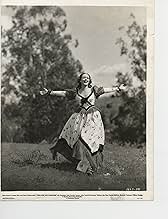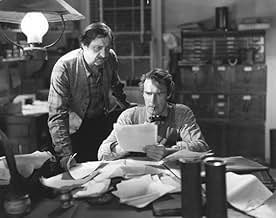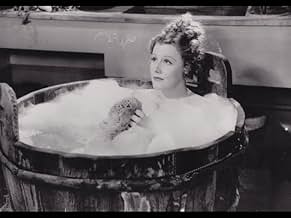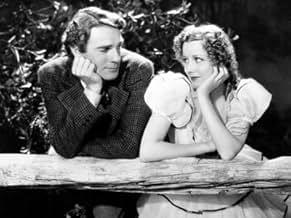Ajouter une intrigue dans votre languePennsylvania, 1859. Railroad tycoon Brennan (Alan Hale) is muscling in on oil-drilling farmers, led by Peter Cortland (Randolph Scott). Cortland must try to save their oil business, while al... Tout lirePennsylvania, 1859. Railroad tycoon Brennan (Alan Hale) is muscling in on oil-drilling farmers, led by Peter Cortland (Randolph Scott). Cortland must try to save their oil business, while also saving his marriage to Sally (Irene Dunne).Pennsylvania, 1859. Railroad tycoon Brennan (Alan Hale) is muscling in on oil-drilling farmers, led by Peter Cortland (Randolph Scott). Cortland must try to save their oil business, while also saving his marriage to Sally (Irene Dunne).
- Director
- Writers
- Stars
- Student
- (uncredited)
Avis en vedette
The story is an unusual one because it's about the nation's first oil wells which were created in Western Pennsylvania in 1859. It begins just before this and a medicine show arrives in town. After a freak fire breaks out and leaves the show stranded, some of the locals take in the medicine show folk. One of them is Sally (Irene Dunne) and soon she is in love with the son of the old lady who took her into her home. As for Peter (Randolph Scott), he looks like a perfect catch for Sally...but little does she know that he's about to strike oil and the oil business would dominate their marrage and sour it as well.
In many ways, this reminded me of the later MGM film "Boom Town", as it's also about the oil business as well as its negative impact on a new marriage. Both are worth seeing, but I'd prefer "Boom Town" simply because it lacks the pointless songs of "High, Wide and Handsome"....none of which are memorable and just seem unnecessary.
Overall, worth seeing IF you don't mind the songs. The finale is pretty neat and the acting quite good.
The rest of the movie is really good, so I'm glad I gave it another chance! No one knows exactly why Randolph Scott left traditional Hollywood and did westerns with his own production company, but when you see him in the 1930s, you'll see him giving his heart to different performances. Although his westerns were very popular, my heart aches that he wasn't given the A-tier Hollywood movies. He could have easily stepped into Shane, High Noon, or any John Wayne flick. He had the talent, the looks, and the onscreen energy to take Hollywood by storm. But I've never seen him exercise his acting chops more than in this movie. In one passionate speech, he's actually moved to tears in order to inspire the workmen to finish the job. He's romantic, determined, and ambitious, convinced that there's oil in the hills. No matter what anyone says, he continues to drill - and one day, it all pays off. But Irene loves him for the country bumpkin he used to be; will everything change when they're rich?
This movie didn't need to be a musical, especially since Irene Dunne only sings a few songs that don't really matter to the storyline. Scottie McScottie Pants never sings, but he does get to gaze adoringly at her as she serenades him. They have such fantastic chemistry together in this movie (and a steamy bedroom kissing scene) it makes you wonder if the sparks flew off the screen, too. With the love shining from his eyes, his blonde curls, and his strong muscles as he drills for oil, you almost forget anyone else is in the movie. But there is Irene Dunne, who loves him above all else, and you'll also see Dorothy Lamour briefly, and a young, brown-haired Charles Bickford!
The story begins with Sally Watterson (Irene Dunne), a young girl traveling with her medicine sideshow father named "Doc" (Raymond Walburn), singing the title song as they settle in a western Pennsylvania town. As "Doc" tries selling some medicine bottles to his patrons, which proves to be a fraud by spectator Peter Cortlandt (Randolph Scott), a fight ensues amongst the crowd, damaging their wagon. Being given the hospitality of her home by Peter's grandmother (Elizabeth Patterson), the stranded Sally earns her keep by helping with the farm animals, and soon gets to know and love Peter, a rugged oil prospector, whom she eventually marries. Their marriage, at first, is a happy union, until Peter neglects his wife in favor of keeping his promise with the neighboring farmers by banding together in laying oil pipelines in order to prevent Red Scanlon (Charles Bickford), a corrupt railroad president, from monopolizing the industry. After Sally is found entertaining on top of the table in the barroom with Molly (Dorothy Lamour), a saloon girl she and Peter had earlier rescued from a lynch mob, the couple find themselves in an argument which sends Sally to leave her husband and return to life entertaining in the passing circus show and to her father, while Peter tries to fulfill his pipeline dream, which, at the present time, proves to be more important than trying to find Sally and resolve matters. The elaborate and well staged sequence with thousands of prospectors racing against time to get the gigantic oil pipeline finished on schedule is almost similar to King Vidor's conclusion of OUR DAILY BREAD (1934) where the farmhands are seen rushing to ditch a waterway in order to save their dying crops, but with this production, an added bonus of rugged fighting scenes and one near miss scene adding to the suspense in which the unconscious Scott is nearly crushed by a falling pipe that lands inches from his head. Whew!
Almost forgotten today and rarely seen in recent years, HIGH, WIDE AND HANDSOME has its share of good tunes, with music and lyrics by Oscar Hammerstein II and Jerome Kern, including: "High, Wide and Handsome," "The Simple Maiden," "Can I Forget You?" (all sung by Irene Dunne); "Will You Marry Me Tomorrow, Maria?" (sung by William Frawley); "The Folks Who Live on the Hill" (sung by Irene Dunne); "The Things I Want" (sung by Dorothy Lamour); "Allegheny Al" (sung by Dunne and Lamour) and "Can I Forget You?" (reprise by Dunne). Of the songs, "The Folks Who Live on the Hill," sung by Irene Dunne wearing her old-fashioned wedding gown, comes off best and memorably, as she sings it to her new husband, Peter (Scott) after showing her the dwelling they are to live. Another memorable moment is seeing William Frawley (years before his "I Love Lucy" TV series days in the 1950s) in full voice singing "Will You Marry Me Tomorrow" during a ceremony. While Irene Dunne is no Jeanette MacDonald or Grace Moore when it comes to vocalizing, many forget how well she singing delivery is, and she does it quite well, but unfortunately, on the whole, the songs did not become as immortal as the other Hammerstein and Kern scores.
In the supporting cast are Alan Hale as Walt Brennan, the head of the transportation syndicate; Akim Tamiroff as the foreign gambler, Joe Varese; Irving Pichel as Mr. Stark; Lucien Littlefield, Purnell B. Pratt, and some light "comedy relief" supplied by Ben Blue playing Zeke, a hired hand. Raymond Walburn, a fine character actor appearing here as Irene Dunne's father, performs his task well, almost as if this role were intended with W.C. Fields in mind, especially with similarities in his medicine show man who tries to defraud his public with phony medicine bottles, etc.
Running ten minutes short of two hours, HIGH, WIDE AND HANDSOME is entertaining, quite original for its time, but sadly, a neglected item. A lot of effort went into this nostalgic production, and it shows. The only thing missing, and a real oversight, is Technicolor. Around this time, Paramount produced some fine Technicolor outdoors films, notably THE TRAIL OF THE LONESOME PINE (1936) with Sylvia Sidney, and EBB TIDE (1937) with Frances Farmer. How cinematic this handsome film would have looked in color. But overlooking this minor flaw, it's a movie worth seeing through once, and after its THE END title and list of actors and their roles (and underscoring to "The Folks Who Live on the Hill") before the final fadeout, it may make one wonder why this is among the rarely-seen western-type musicals gems (even with Turner Classic Movies showing August 16, 2019) from the "golden age of Hollywood" period. (***1/2)
Le saviez-vous
- AnecdotesAccording to Margaret J. Bailey's book on Hollywood costume design of the 1930's, "Those Glorious Glamour Years," apple trees in blossom were required for some scenes. Frost in California had decimated the apple trees, so studio technicians at Paramount Studios worked overnight, peeling rosebuds down and sticking them on bare trees with maple syrup to simulate an apple orchard in full blossom.
- Citations
Mac: I'll bet Sally will be glad to get away from here.
Doc Watterson: You think so, Mac?
Mac: Sure. She's always fightin' with that Cortlandt fella. She hates the sight of him.
Doc Watterson: You know human nature, don't you Mac?
Mac: From A to Z.
Doc Watterson: You must have skipped W. The women come under W.
Meilleurs choix
- How long is High, Wide and Handsome?Propulsé par Alexa
Détails
- Date de sortie
- Pays d’origine
- Langue
- Aussi connu sous le nom de
- Jerome Kern and Oscar Hammerstein's High, Wide and Handsome
- Lieux de tournage
- société de production
- Consultez plus de crédits d'entreprise sur IMDbPro
Box-office
- Budget
- 1 900 000 $ US (estimation)
- Durée1 heure 50 minutes
- Couleur
- Rapport de forme
- 1.37 : 1
Contribuer à cette page






































